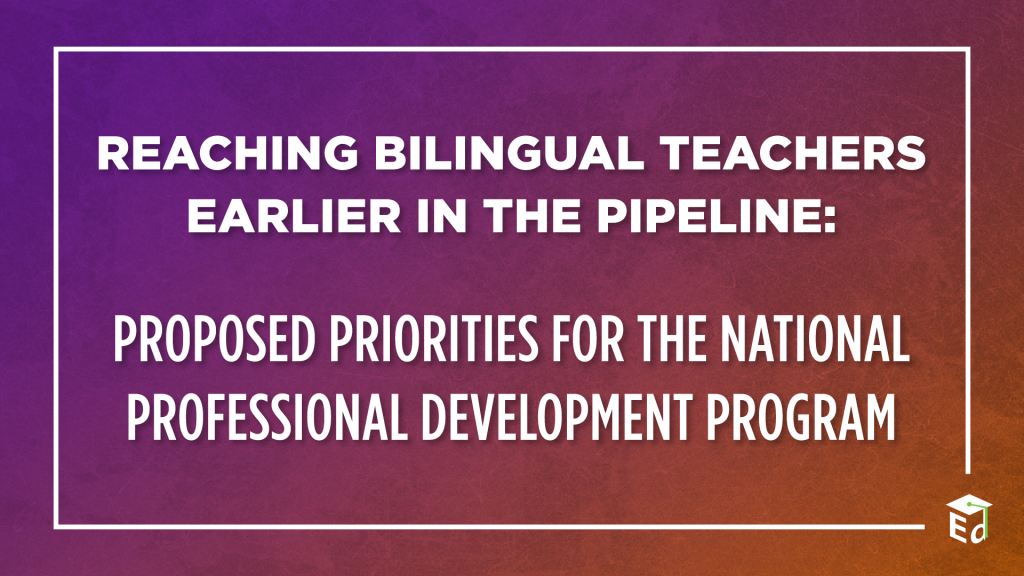
By: Montserrat Garibay, Assistant Deputy Secretary and Director, Office of English Language Acquisition
I clearly remember my first day of middle school as a newly arrived student from Mexico in Austin, Texas, I didn’t speak a word of English and was nervous to start a new life with my mother and sister. My first class looked like the United Nations, students from all over the world speaking different languages, we were shy and scared. It wasn’t until, our ESL teacher, Mrs. Hernandez welcomed us with a big smile that I knew t I was going to be fine. My feelings were confirmed when I heard her speak Spanish.
Within a few months, everyone in the class was learning. Mrs. Hernandez had high expectations for all the students; her classes were rigorous, she had us working in groups, collaborating, singing, and using different strategies. Her classroom was full of diverse books, multicultural pictures and a world map with our pictures and displaying our best work. She had also established a strong relationship with my mom and would communicate with her often to let her know how I was doing in school. She would share about different resources such as food banks and after school programs for tutoring.
Within a year, I was able to transition to regular English classes. Years later, I graduated from high school all because of Mrs. Hernandez’s strong foundation., she helped me believe in myself. Mrs. Hernandez was my inspiration to become a bilingual teacher. I wanted to be just like her. Her presence inspired me to embrace multilingualism, become a critical thinker, and actively engage with families. That experience fueled my passion for education and led me to become a teacher.
Nearly a decade later, when I was a bilingual pre-k teacher at the same school district where I attended middle school and graduated from high school in Austin, Texas, I had the opportunity to pursue my master’s degree in Bilingual Education at the University of Texas at Austin through Proyecto Maestria, a National Professional Development (NPD) grant from the U.S. Department of Education.
At the time, Proyecto Maestria may not have been called a “grow-your-own” effort, but it had the components of what we know today to be beneficial. This grant opened the door to expand my knowledge about the importance of quality bilingual education, the impact that it can have on promoting biliterate and bicultural students, and the benefit of continuing as a bilingual teacher in my home community. That NPD grant had a significant impact on my life because it provided me with the opportunity to continue my education with the goal of providing an exceptional education for my students. Getting to this point in my career though, wasn’t easy. I had to navigate working multiple jobs to pay for my tuition, being a first-generation college student, taking remedial math classes to be proficient in math. I can only imagine how many more doors it could open if it were available for aspiring educators who need help getting their foot in the door – who perhaps like me, want to serve kids like the ones we were, but don’t have all the resources to get started.
This is why the Department is proposing new priorities, requirements, and definitions in the NPD program that would grow our numbers of bilingual and multilingual educators to expand the availability of bilingual programs for all students and help ensure that English Learners have access to well-prepared educators, and emphasize and elevate supports for students from low-income backgrounds. The Notice of Proposed Priorities (Federal Register :: Proposed Priorities, Requirements, and Definitions-National Professional Development Program invites public comment for 30 days.
Montserrat Garibay is the Assistant Deputy Secretary & Director for the Office of English Language Acquisition at the U.S. Department of Education. Previously, she served as the Senior Advisor for Labor Relations at the Office of Secretary for two years. Garibay was a bilingual pre-kindergarten teacher for eight years and a National Board-Certified Teacher in Austin, Texas. She served as Vice President for Certified Employees with Education Austin, a merged union local with the American Federation of Teachers and the National Education Association. She graduated from the University of Texas-Austin with a Master of Education.
